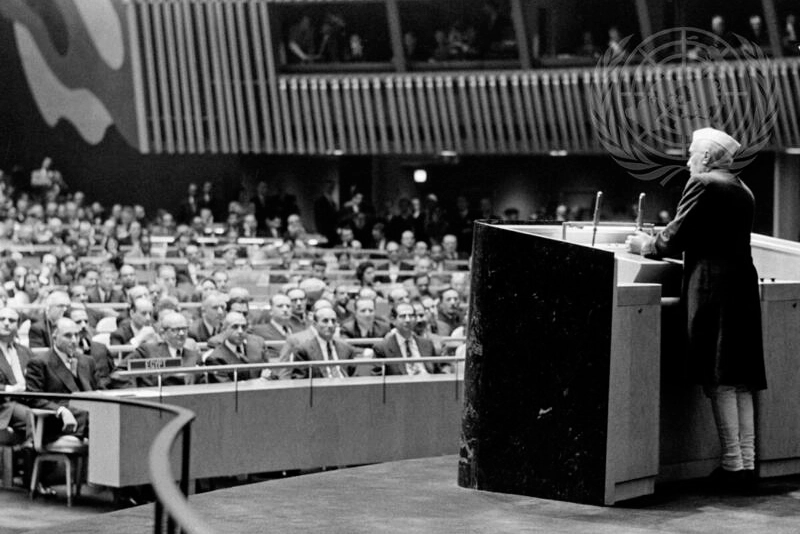
Setting Records Straight on Nehru’s Legacy
This article sets the record straight by examining the facts surrounding Jawaharlal Nehru’s tenure and the interim government of 1946–47.

[Jawaharlal Nehru addressing the UN General Assembly. (Image: UN Archives)]
Recent social media posts have sparked controversy by claiming that Prime Minister Narendra Modi has surpassed Indira Gandhi’s uninterrupted tenure as India’s prime minister. These narratives conveniently omit that Indira Gandhi served not only from 1966 to 1977 but also from 1980 until her tragic assassination on October 31, 1984.
More disturbingly, some have falsely labeled Jawaharlal Nehru as an “unelected” prime minister from 1946 to 1952, alleging he swore allegiance to the British Crown rather than the Indian Constitution. Such claims, often propagated by ideologically driven groups, distort India’s political history and undermine the legacy of its freedom struggle.
This article sets the record straight by examining the facts surrounding Nehru’s tenure and the interim government of 1946–47.
The Interim Government of 1946: A Diverse Coalition
The interim government, formed on September 2, 1946, under Jawaharlal Nehru’s leadership, was a critical step in India’s transition to independence. It was not a unilateral appointment but a coalition reflecting India’s diverse political landscape. The first cabinet included:
- Jawaharlal Nehru – Vice-President of the Executive Council, External Affairs & Commonwealth Relations
- Vallabhbhai Patel – Home Affairs, Information & Broadcasting
- Baldev Singh – Defence
- John Matthai – Finance
- C. Rajagopalachari – Education
- C.H. Bhabha – Commerce
- Rajendra Prasad – Food & Agriculture
- Asaf Ali – Transport & Railways
- Jagjivan Ram – Labour
- Sarat Chandra Bose – Works, Mines & Power (resigned; replaced by Vallabhbhai Patel)
- Syed Ali Zaheer – Law
- Cooverji Hormusji Bhabha – Commerce (later handled Works, Mines & Power)
On October 26, 1946, the Muslim League joined, adding members like Liaquat Ali Khan (Finance), I.I. Chundrigar (Commerce), Abdur Rab Nishtar (Posts & Air), Ghazanfar Ali Khan (Health), and Jogendra Nath Mandal (Law, representing Scheduled Castes). This coalition, formed under British oversight, required all members to take an oath of allegiance to their office, administered by the Viceroy. There is no evidence suggesting Nehru’s oath differed from that of his colleagues, including Patel or Mandal.
The First Cabinet of Independent India
After independence on August 15, 1947, Nehru led India’s first cabinet, sworn in under Governor-General Lord Mountbatten. This cabinet was equally diverse, comprising:
- Jawaharlal Nehru – Prime Minister, External Affairs & Commonwealth Relations, Scientific Research
- Vallabhbhai Patel – Home Affairs, Information & Broadcasting, States
- Baldev Singh – Defence
- Rajendra Prasad – Food & Agriculture
- Maulana Abul Kalam Azad – Education
- John Matthai – Railways & Transport
- Rafi Ahmed Kidwai – Communications
- Rajkumari Amrit Kaur – Health
- B.R. Ambedkar – Law
- R.K. Shanmukham Chetty – Finance
- Syama Prasad Mookerjee – Industry & Supply
- C.H. Bhabha – Commerce
- Jagjivan Ram – Labour
- N.V. Gadgil – Works, Mines & Power
This cabinet included luminaries like Patel, Ambedkar, and Mookerjee, all of whom took the same oath of office as Nehru. Claims that Nehru alone swore allegiance to the British Crown are baseless and lack documentary evidence. The oath was a standard procedure for all ministers during the transitional period.
Debunking the “Unelected” Myth
The assertion that Nehru was an “unelected” prime minister from 1946 to 1952 is a gross misrepresentation. The interim government was formed following the 1946 provincial elections, where the Indian National Congress secured a significant mandate. Nehru was chosen as the leader by elected representatives, not appointed by the British. The Constituent Assembly, tasked with drafting India’s Constitution, was also elected indirectly through provincial assemblies.
To dismiss Nehru’s leadership as “unelected” is to question the legitimacy of the entire Constituent Assembly, including the contributions of figures like Ambedkar, who drafted the Constitution, and Patel, who unified the princely states.
The transfer of power was a gradual process, beginning in the 1930s with the Government of India Act, 1935, which introduced provincial autonomy and elections. The Indian National Congress boycotted the 1930 elections but participated fully in 1937 and 1946, winning majorities in most provinces. Nehru’s appointment as head of the interim government and later as India’s first prime minister was rooted in this democratic mandate, not British fiat.
The RSS and Historical Revisionism
Certain groups, often aligned with the RSS, have propagated narratives that vilify Nehru while ignoring the collective contributions of his contemporaries. These narratives falsely single out Nehru for taking an oath of allegiance, conveniently ignoring that Patel, Mookerjee, and others took the same oath. Such selective storytelling aims to discredit Nehru’s legacy while whitewashing the contributions of others who worked alongside him.
The claim that Nehru was solely responsible for post-independence challenges is equally misleading. The partition, communal violence, and economic difficulties were complex issues tackled by the entire cabinet. Patel’s role in integrating princely states, Ambedkar’s work on the Constitution, and Azad’s contributions to education were integral to India’s early years. To pin all failures on Nehru while ignoring the collective responsibility of his cabinet is intellectually dishonest.
A Unified Vision for India
Nehru, Patel, Ambedkar, and their contemporaries had differences, as is natural in a democracy. However, they shared a commitment to a secular, democratic, and inclusive India. Their debates—whether between Nehru and Patel on governance or Nehru and Ambedkar on social reforms—were rooted in a shared vision for a united nation. The Constitution, a product of their collective efforts, embodies this vision with its emphasis on secularism, socialism, and republican democracy.
Critics who reject secularism or socialism as foundational principles are, in effect, challenging the very framework of India’s Constitution. The freedom struggle, led by these leaders, was not a gift from the British but a hard-won victory through decades of sacrifice. To reduce it to petty political point-scoring is to diminish the legacy of India’s independence movement.
Conclusion
India’s rise as a global power owes much to the visionary leadership of Nehru, Patel, Ambedkar, and others who laid its foundation. Distorting their contributions for political gain undermines the nation’s history and the sacrifices of its freedom fighters. Nehru was not an unelected leader imposed by the British; he was a democratically chosen prime minister who led a diverse cabinet through tumultuous times.
The facts are clear: Nehru, like his colleagues, took the same oath, worked for the same nation, and shared the same dream of a free, inclusive India. Let us honor their legacy by embracing truth over propaganda.
Moreover, it is equally important that a prime minister might have a short tenure but might be much more respected for his life. Two of India’s greatest prime ministers were Lal Bahadur Shastri and Vishwanath Pratap Singh and their term was limited but when history was written then their role as political leaders, their simplicity of life, honesty of ideology would always be remembered.
Let us be clear that a nation wil not count days and years of somebody’s prime ministership. Leaders remain in our heart with the empathy they have for people and the vision for the future which is inclusive in nature and respect for diversity, liberal values and social justice.
[The writer, Vidya Bhushan Rawat, is a Social Activist and Political Commentator.]
Follow ummid.com WhatsApp Channel for all the latest updates.
Select Language To Read in Urdu, Hindi, Marathi or Arabic.
